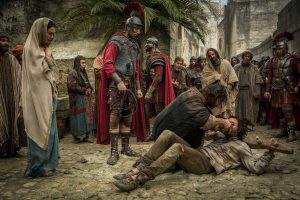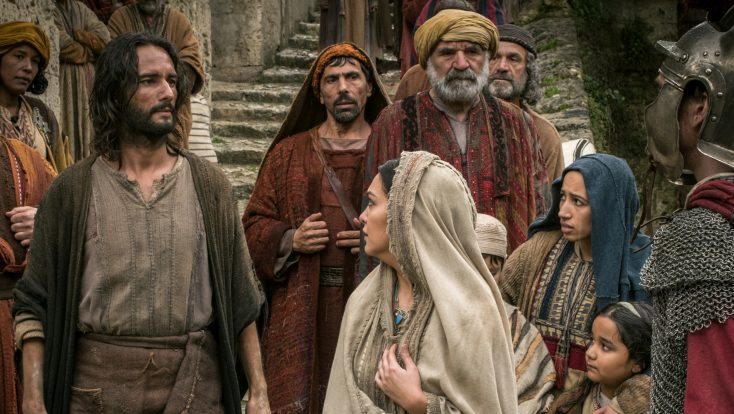
Nazanin Boniadi plays Esther, Allan Cappelli plays Burley Centurion, Rodrigo Santoro plays Jesus and Jack Huston plays Judah Ben-Hur in BEN-HUR. ©Paramount Pictures and Metro-Goldwyn-Mayer Pictures. CR: Philippe Antonello.
By ANGELA DAWSON
Front Row Features
HOLLYWOOD—Brazilian actor Rodrigo Santoro can’t seem to get out of ancient history. He played the mighty Persian god-king Xerxes in “300” and its sequel “300: Rise of an Empire.” He now plays another king: the King of Kings (a.k.a. Jesus Christ) in the stylish remake of the swords-and-sandals epic “Ben-Hur.”
While his countrymen were playing host to the world with the 2016 Rio Summer Olympic Games, Santoro was on duty publicizing the faith-based and action-packed film.
“Half of my heart is there, half is here,” the 41-year-old actor says. “I would love to be there. I love to be here. It is really personal. I couldn’t not be here now.”
Of course, taking on the role of the Son of God was something the actor approached with some trepidation but also as a welcome challenge.
Born near Rio De Janeiro, Santoro grew up in a Catholic household and one of his first roles in his native land was playing a priest in a miniseries. His first English-language project was a TV film called “The Roman Spring of Mrs. Stone,” in which he co-starred with Helen Mirren, Olivier Martinez and Anne Bancroft, in her final role. He subsequently appeared in the sequel “Charlie’s Angels: Full Throttle,” establishing him as a Latin heartthrob. His other credits include “Love, Actually,” a short stint on the ABC’s “Lost” and he was the Brazilian voice of “Stuart Little.”
It was the “300” films that have made Santoro, twice playing the pesky and ruthless Persian invader, a household name.
“Ben-Hur” tells the story of Judah Ben-Hur (British actor Jack Huston), a Jewish prince who is betrayed by his adoptive brother, Messala (fellow Brit Toby Kebbell) and becomes a slave for many years. In his journey to salvation, he runs into a seemingly extraordinary carpenter and teacher.
Timur Bekmambetov directs the newly released film from a screenplay by Keith Clarke and John Ridley, which is based on Lew Wallace’s “Ben-Hur: A Tale of Christ” novel.
Santoro says the first thing he had to do was attempt to erase his preconceived ideas about Jesus.
“Things I’ve heard, things that even my grandma told me when I was growing up,” he said, “I went to a neutral place and started from there.”
Santoro embarked on a physical and mental regime to prepare for the role. He spent a lot of time practicing yoga and meditation. He also adopted a strict, cleansing diet. He even reportedly sought and received a blessing from Pope Francis before filming began.
Q: How did the role come to you ? Did you get a call from executive producers Roma Downey and Mark Burnett?
Santoro: No, I only had the pleasure to meet Roma and Mark afterwards. I don’t know exactly where it came from.
Q: Roma Downey has said Jesus has to have some kind of stillness with him when he walks into a room, and that’s what you have.
Santoro: I take that as a compliment. I had a meeting with Timur Bekmambetov over Skype. It was him and John Ridley, the writer. They were in a restaurant. It was loud and everything was happening but we wanted to have the meeting right away. I was overwhelmed with the idea, in general. I didn’t know what to think. We had this meeting where they were handling the phone and Skype and I’m like, “Uhh.” I asked a lot of questions. I’ve never asked so many questions. I think because I was scared, and I wanted to make sure that I was going to work with the right people. I read the script, which I thought was very, very well written. I had that, but then to take on Jesus; he’s been portrayed so many times. I wondered, “How are we going to do this?” So I started to ask questions and I actually finished that Skype and my agent called me and I said, “It’s not happening. I don’t think it went well in the meeting.” That was my feeling; and it was quite the opposite. They felt that I was just on it. I was really overwhelmed, that’s the word. It was a mix of anxiety and excitement and I was just in a different atmosphere, and I think that translated somehow into stillness.
Q: It must be a very surreal moment when you are on the Cross. I would imagine for any actor, this is a moment that is very hard to really wrap your mind around. You know you’re going to do it, but on the day of, what did you think?
Santoro: You wish you’re going to do it. At first you wish you can do it. You only can wish, you only can hope that all right, that it’s going to be all right. The importance, the meaning of the cross, it defines society before and after, so it carries so much responsibility and weight. I’m conscious of, not a conscious level, but it’s just looking at it. It’s already very powerful. Yes, being up there it is not possible to describe. The words will never do justice to how does it feel. And it was extremely cold. We were in Matera. It was snowing the night before. We’re talking about real cold. Then the next day it opened this beautiful, winter sunny day, but cold. So cold.
Q: You had nearly no clothes on. What did they do to keep you from freezing?
Santoro: I was wrapped around this big thermal thing. They put me in a little hut. Then, from there, I went up and then I asked to do one take and we did a 20-minute take, a long take. It was freezing cold. Somehow it helped, because my body was freezing and my brain was frozen. I couldn’t think straight, which was great. It was such a nice feeling.
Q: Did you feel an extra responsibility because you were playing Jesus and did you feel a responsibility to the role? Was it a heavy burden?
Santoro: Absolutely. It was the weight of the world, the expectation of the world. It doesn’t matter if you’re a religious person or not. Everybody has a relationship with an image of Jesus, an expectation about it. If you think about fulfilling those expectations, you just can’t do anything. That was my first challenge, to put that aside if possible, as much as I could and not to think, which is difficult, because I’m a human being with my ego and my fears.
Q: Christianity is the main religion in your country, isn’t it?
Santoro: Oh yeah. Big time. I have the Christ the Redeemer statue out of my window where I live. So yeah, I see Him every single day. I grew up hearing stories about Him. The weight, the responsibility and the challenges were giant, but it was the learning that was far greater than that. Just the experience itself you can’t even compare, so I chose to do something that I knew was going to be just a unique, very enriching experience for my own life. Somehow it was like rewriting things in my life. It was an exploration of my own faith, of my own heart, how I feel about people, how I deal with people, about my humanity, my limitations. It was huge internal research, which taught me so much about myself and about how much work I have to do.
Q: Do you feel more spiritual now?
Santoro: It’s really about visiting a place within yourself that creates this space, this place within yourself that you know that it’s alive there. That it exists. Of course it’s not easy, especially with all the distraction in this world we’re living in. Also, knowing that His teachings became much more profound for me after the experience, because now I’m like, “Oh, I kind of get it. At least if I can grasp a little, far away, a little tiny fraction of what He meant, what is it about. It’s already a huge thing.” It’s life changing because now you can’t go back.
Q: How is it being here when the Olympics is going on back home? Have you been able to catch any of it on TV?
Santoro: Yeah, I’ve been watching NBC. I’ve been watching every night and every time I can. Half of my heart is there, half is here. I would love to be there. I love to be here. It is really personal. I couldn’t not be here now. Trust me, I had many, how do you say, tempting offers to be in Brazil. Just to follow the Olympics, just to be there, to be everywhere, to be a part of it. But this, to me, is as important. It’s been great because as I talk, it’s like therapy. As I talk I encounter things. It makes me feel things, It reminds me of things and I discover new things. I actually try to make this process, the junket, instead of being, “Oh, here I go. Same question again. Same answer again.” No, no. I try to receive it and flow with it.





